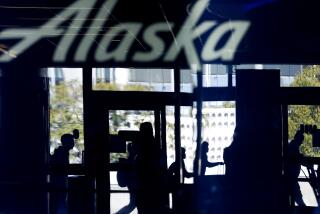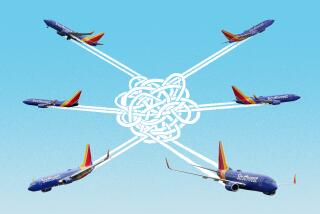Airlines lightening the load
- Share via
Airline mergers may be off the table, for now, but a major industry reordering is still under way as United, Delta and Northwest Airlines contemplate deep cuts to withstand skyrocketing oil prices and a slowing economy.
Prompting executives to action: fuel costs that have soared by more than 20 percent since January and a heart-stopping drop in airline stocks in the past month after carriers considered, but weren’t able to complete, massive mergers.
Jumps in crude oil prices and jet-fuel refinery costs during the past six weeks have thrown airline budgets out of whack across the industry. Even with a spate of fare hikes, airlines are recapturing only about 60 percent of their higher fuel tab, making additional cuts necessary, analysts said.
Chicago-based United said it would shed 15 to 20 of its older Boeing 737s by year-end as it copes with a potential $1.2 billion increase in its fuel costs this year.
Facing a fuel bill that was suddenly $900 million higher than anticipated, Delta executives unveiled large-scale job and capacity reductions. Delta plans to eliminate about 2,000 positions by offering buyouts to 30,000 employees. The Atlanta-based carrier also will trim its domestic flying by 10 percent by August, doubling the cut it had announced, while parking or selling as many as 45 jets.
Analysts predict the industry is headed for a profitless year, making it all the more urgent for airlines to trim costs wherever possible.
“We must act quickly and decisively, as speed in execution leads to success,” Delta Chief Executive Richard Anderson and Chief Financial Officer Ed Bastian told employees in a memo last week. “With fuel expected to remain at approximately $100 per barrel for the foreseeable future, we must take action to keep Delta strong.”
Northwest also is looking at trimming routes and parking gas-guzzling DC-9s, although executives won’t provide specifics until after the Eagan, Minn.-based carrier completes a detailed review of its operations.
“Liquidity is first and foremost on everybody’s minds,” Dave Davis, Northwest’s executive vice president and chief financial officer told a JPMorgan investor conference in New York last week.
Little cushion for setback
The emphasis on preserving cash is a reversal for an industry that earned billions of dollars in 2007. But with limited access to traditional capital markets, airline executives have little cushioning against losses they see coming, one reason major carriers are quickly dumping unprofitable flying.
“This is why [domestic] capacity is being cut so dramatically,” said aviation consultant Robert Mann, president of R.W. Mann & Co. “What they have, they have. There’s not much more [cash] they can get, so they better be able to husband cash the best they can.”
Carriers can’t count on mergers to reduce overhead costs and spur international revenue by broadening international networks either. Delta and Northwest were close to announcing a game-changing deal in February, but talks foundered after their pilots were unable to resolve how to integrate their workforces. That also undermined a tie-up between United and Continental, since Northwest relinquishes its veto power over a deal by Houston-based Continental only if Northwest strikes a deal of its own.
“I don’t think mergers are likely,” said Julius Maldutis, president of Aviation Dynamics Inc., a New York-based consulting firm. “We will see massive internal restructuring at each airline to try to stave off the corrosive effect of oil at $110.”
Asset values reduced
United will continue to look for cost and capacity cuts as it explores spinning off its frequent-flier business and San Francisco maintenance base, said Chief Financial Officer Jake Brace, speaking at last week’s investor conference.
Complicating United’s decision: Buyers may not be in a position to pay top dollar for those assets, since financing for leveraged deals has disappeared amid the credit-market’s meltdown.
“In a market like this, it’s not clear the assets are worth what they were a year ago,” Mann said.
The biggest challenge remains fuel costs, which are airlines’ largest expense. Total fuel costs for the 10 largest U.S. airlines will top $38 billion in 2008, up 52 percent from 2007, estimates AirlineForecasts, a Virginia-based market research firm. That’s four times higher than the $9.7 billion that these carriers cumulatively paid for jet fuel in 2002.
But as fares rise, carriers likely will find it increasingly difficult to pass along fuel costs to consumers, particularly if a slowing economy prompts companies or families to trim their travel budgets.
“Clearly, the industry has to do something,” said Vaughn Cordle, CEO and chief analyst of AirlineForecasts. “It’s an ugly picture.”
More to Read
Sign up for The Wild
We’ll help you find the best places to hike, bike and run, as well as the perfect silent spots for meditation and yoga.
You may occasionally receive promotional content from the Los Angeles Times.






